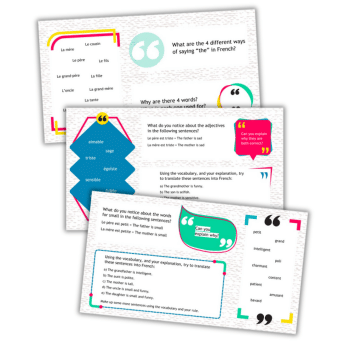Tougher GCSEs are Turning Students Away from MFL

Making exams tougher may well raise standards – but if fewer young people choose to study a language at GCSE as a result, is it really worth it, asks Amanda Barton…

My 13-year-old daughter has just chosen her options. A modern foreign language is not one of them.
For someone who has spent a considerable proportion of her career promoting languages, this has come as a bit of a blow to me.
But I can understand and sympathise with her decision, and she is by no means alone. According to a recent BBC report, foreign language learning is at its lowest level in UK secondary schools since the turn of the millennium.
It is bizarre that we are seeing an exodus from a subject the value of which will most likely be higher post-Brexit; business organisations are already expressing concern at the lack of language skills in the UK.
The view held by some parents, however – that MFL will become redundant – may be partly responsible for the decline. As I overheard one father asking another at options evening, ‘What’s the point in taking a language after Brexit?’
Difficult and dull
One of the main factors in students opting out is the perception that languages are a ‘high risk’ choice; your chances of getting a good grade are lower than in other subjects.
It is widely acknowledged that MFL suffers from severe grading in comparison with other subjects, and the increased difficulty of the new GCSE exam compounds the problem.
Of the 2,048 secondary schools that took part in the BBC survey referenced earlier, most said that perceived difficulty of languages was the main reason for the drop in the number of pupils opting for the subject.
My daughter, currently working at grade 7 in French, was told by the head of department that she would find the GCSE challenging as it was only for ‘high-flyers’. Others of her calibre were similarly discouraged.
Much as I would like to castigate her teacher for the negative impact on my daughter’s self-esteem I can nevertheless see her point.
And head teachers, protective of their position in the performance league tables, are unlikely to encourage students to opt for a subject which could compromise their school’s ranking.
Ofqual’s ongoing evaluation of the new GCSE exams in languages concludes that they are functioning better than the old ones.
Many MFL teachers are keen to point out, however, that the new specification is far more difficult than its predecessor and, frankly, rather dull.
Your average 15-year-old is not likely to have much interest in being asked what they think about marriage, or how many children they might have in the future.
Much of the content seems to have been directly imported from the A level specification.
Students are required, for instance, to respond to questions on how they would help the homeless, what actions they and their family take to help the environment, or their relationship with technology.
Rethink required
Then there is the question of whether the new exams are fit for purpose. In the listening and reading papers, students have to answer some of the questions not in English, but in the foreign language.
These also happen to be the exams where Ofqual found that the vocabulary used is more demanding than previously.
This raises the question of validity: if the exam is meant to be testing students’ passive understanding of spoken or written language, how is this reasonably assessed through their production of the target language?
By 2022, the government hopes that 75% of pupils will be studying the EBacc subject combination which must include a language.
If the decline continues, schools will have to rethink their languages strategy as a matter of some urgency. Where is the sense in making a subject more difficult just at the time when we should be actively encouraging more students to opt into it?
There are some glimmers of hope: the take up of Spanish and Mandarin has increased.
And my daughter and some of her peers have not given up on languages entirely, hoping to take a GCSE in Spanish at the local sixth-form college once they’ve left school. Fingers crossed or, as the Germans would have it, thumbs pressed.
Dr Amanda Barton is a writer, former MFL teacher and author of Getting the Buggers into Languages (Bloomsbury).











